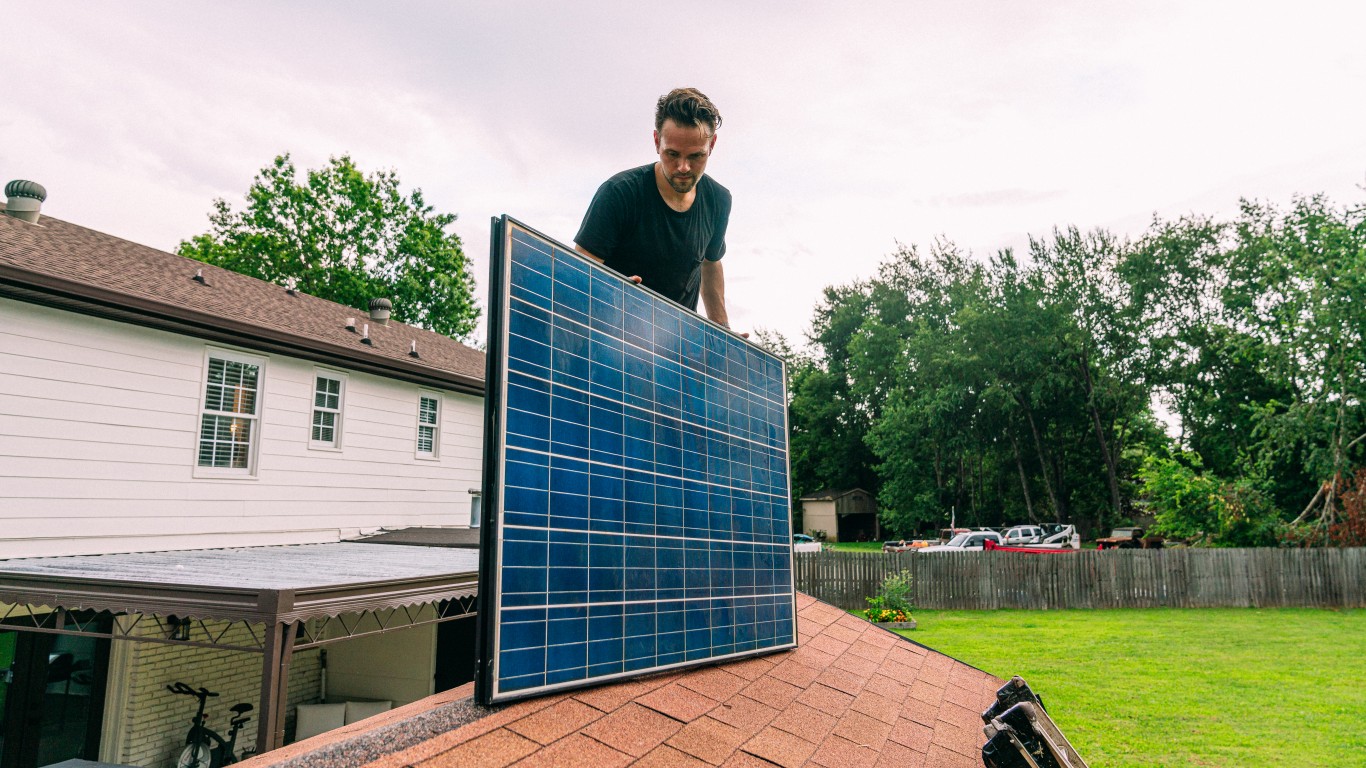
Tomorrow voters in five states will decide whether or not to legalize recreational marijuana use. Currently, 5.4% of Americans live in states where recreational marijuana is legal. After the election, that percentage could rise to 23.1%.
Ballot initiatives this year reflect America’s changing attitude towards the drug. Prohibited across the country less than five years ago, marijuana is now legal and regulated in Alaska, Colorado, Oregon, Washington, and the District of Columbia.
[in-text-ad]
24/7 Wall St. reviewed current marijuana laws as well as usage rates in the five states that could legalize recreational marijuana this election.
Click here to see the 5 states voting to legalize marijuana.
A state’s legislative process is an important factor in its path towards legalization of marijuana. In an August 2016 interview with 24/7 Wall St., Morgan Fox, senior communications manager with Marijuana Policy Project, a marijuana legalization advocacy group, explained, “Traditionally, voters have been far ahead of politicians when it comes to supporting marijuana policy reform.” As a result, states that allow ballot initiatives — through which voters can propose statutes and constitutional amendments — are more likely to legalize marijuana sooner than states that do not allow ballot initiatives.
The four states that have legalized recreational marijuana use have done so through ballot initiatives, and all five states voting to legalize next week are doing so through a ballot initiative.
Relatively high usage rates among voting-age adults in these five states also suggest a tolerant attitude towards the drug. In Massachusetts, for example, nearly one in five adults have used marijuana in the past year, one of the highest usage rates in the country.
While not a critical step towards full-scale legalization, states that allow marijuana use for medical reasons are also more likely to repeal prohibition. Legal medicinal use reflects a relatively tolerant attitude towards pot and also helps voters better understand the issue. “One of the potential benefits of having a functional medical marijuana program is that voters are able to see what a regulated marijuana industry looks like,” Fox said. This, in turn, can help people “envision what it would look like under a legalized system.” All five of the states voting on legalization allow medicinal marijuana use for certain conditions.
24/7 Wall St. reviewed current marijuana laws as well as usage rates in the five states that could legalize recreational marijuana this November. State marijuana laws came from the National Organization for the Reform of Marijuana Laws, and marijuana use and perceptions of risk came from the Substance Abuse and Mental Health Services Administration. In states that have not decriminalized marijuana, maximum fines are listed for the smallest amount penalized for first-time offenders.
These are the next states to legalize marijuana.
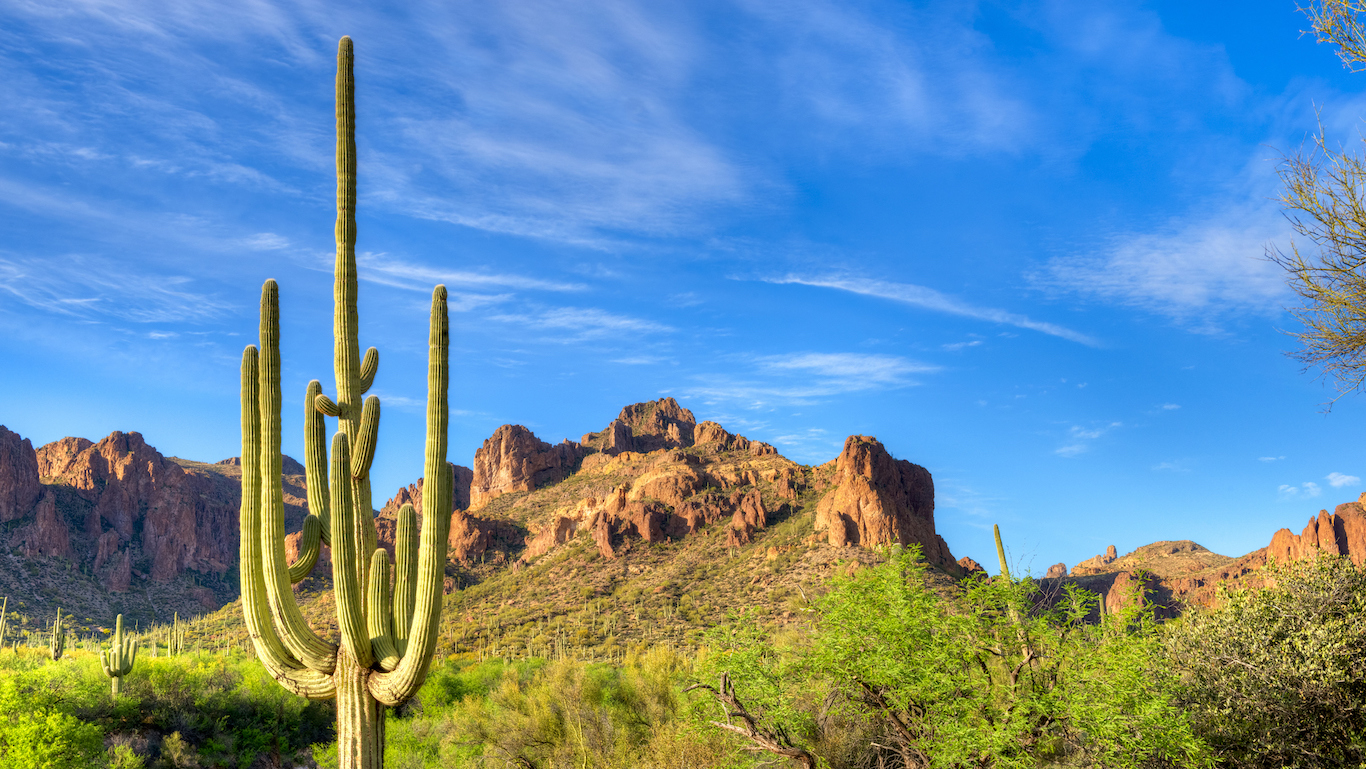
1. Arizona
> Ballot name: Arizona Regulation and Taxation of Marijuana Act
> Amount decriminalized: N/A
> Max. fine for less than 2 lbs: $150,000
> Pct. adults using in past year: 13.5%
Currently, penalties for marijuana possession in Arizona are among the most severe in the country. Arizona is the only state where a person possessing any amount of marijuana can face felony charges. In addition, possession can lead to a two-year prison sentence and up to a $150,000 fine.
[in-text-ad]
Despite the draconian laws, Arizona may well be the next state to legalize recreational marijuana. State voters submitted more than enough petition signatures to the Secretary of State in late June to include a ballot initiative to end marijuana prohibition and effectively regulate the drug in a manner similar to alcohol. If passed, the provision, known as Proposition 205, would allow adults 21 and older to possess up to an ounce of marijuana. A report released by the state’s Joint Legislative Budget Committee estimates that legalizing marijuana would generate $82 million in additional tax revenue annually.
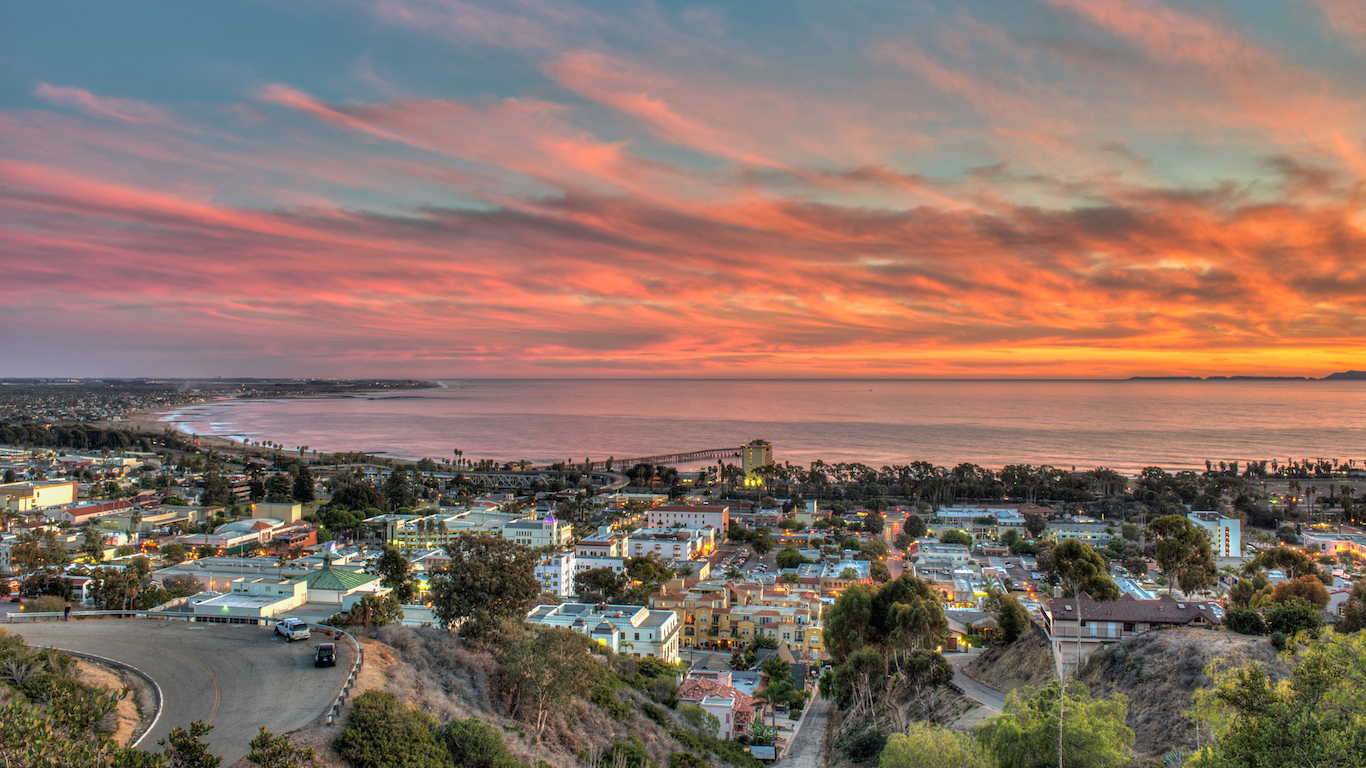
2. California
> Ballot name: Adult Use of Marijuana Act
> Amount decriminalized: 28.5 g or less
> Max. fine for 28.5 g or less: $100
> Pct. adults using in past year: 14.4%
California voters have said no to legalizing recreational marijuana use multiple times: first in 1972 and again in 2010 but by a much slimmer margin. This year may be different, as voters will, again, be given the opportunity to overturn marijuana prohibition. Proposition 64, commonly referred to as the Adult Use of Marijuana Act, would legalize, regulate, and tax marijuana. Proponents say the proposition will save state and local governments tens of millions of dollars in enforcement of marijuana laws and potentially bring in more than a billion dollars in tax revenue annually. Recent polls suggest Proposition 64 will easily pass.
Despite some early defeats for marijuana reform groups, the state has historically had a relatively progressive attitude towards pot. California became the first state to legalize medical marijuana in 1996, and Gov. Arnold Schwarzenegger decriminalized possession of less than an ounce of marijuana in October 2010.
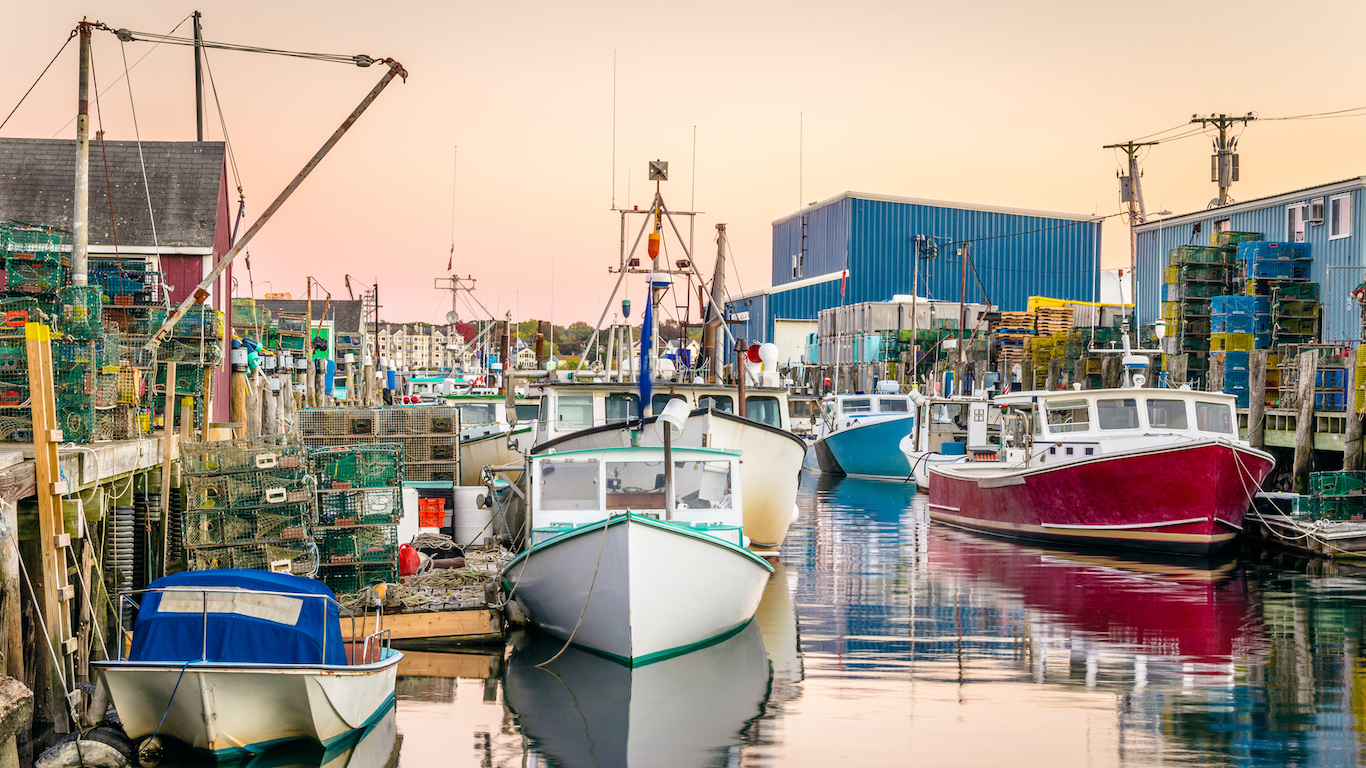
3. Maine
> Ballot name: Marijuana Legalization Act
> Amount decriminalized: 1.25 oz or less
> Max. fine for 1.25 oz or less: $600
> Pct. adults using in past year: 19.8%
Historically, Maine has been among the states leading the campaign for marijuana reform. Possession of small amounts of pot has been decriminalized in the state since the mid 1970s, and Maine voters legalized the drug’s medicinal use in 1999. In November 2014, Portland became the first city on the East Coast to legalize recreational marijuana use. City voters overwhelmingly passed a law allowing adults 21 and over to possess up to 2.5 ounces of marijuana. Voters statewide will have the opportunity to pass a similar law for the rest of the state this November. Proponents of the Marijuana Legalization Act, known as Question 1, argue that ending prohibition will make communities safer and raise millions of dollars in tax revenue.
As in many other states potentially on the brink of legalizing, marijuana use is relatively common in Maine. Nearly one in five adults in the state have used marijuana in the past year, a larger share than in all but three other states.

4. Massachusetts
> Ballot name: The Regulation and Taxation of Marijuana Act
> Amount decriminalized: 1 oz or less
> Max. fine for 1 oz or less: $100
> Pct. adults using in past year: 17.4%
Massachusetts voters will have an opportunity to legalize recreational marijuana use through a ballot initiative this November. The initiative, known as The Regulation and Taxation of Marijuana Act, or Question 4, would end marijuana prohibition in the Bay State. Proponents of legalization in Massachusetts argue that an end to prohibition will unclog the state’s justice system, bring in at least $100 million in tax revenue, and possibly help combat the state’s opioid addiction epidemic.
[in-text-ad]
Voters in Massachusetts are far less likely than most Americans to perceive marijuana use as inherently risky. Only 19.7% of adults in the state associate great risk with monthly pot use, a considerably smaller share than the 27.8% of Americans 18 and older who consider marijuana use as risky.
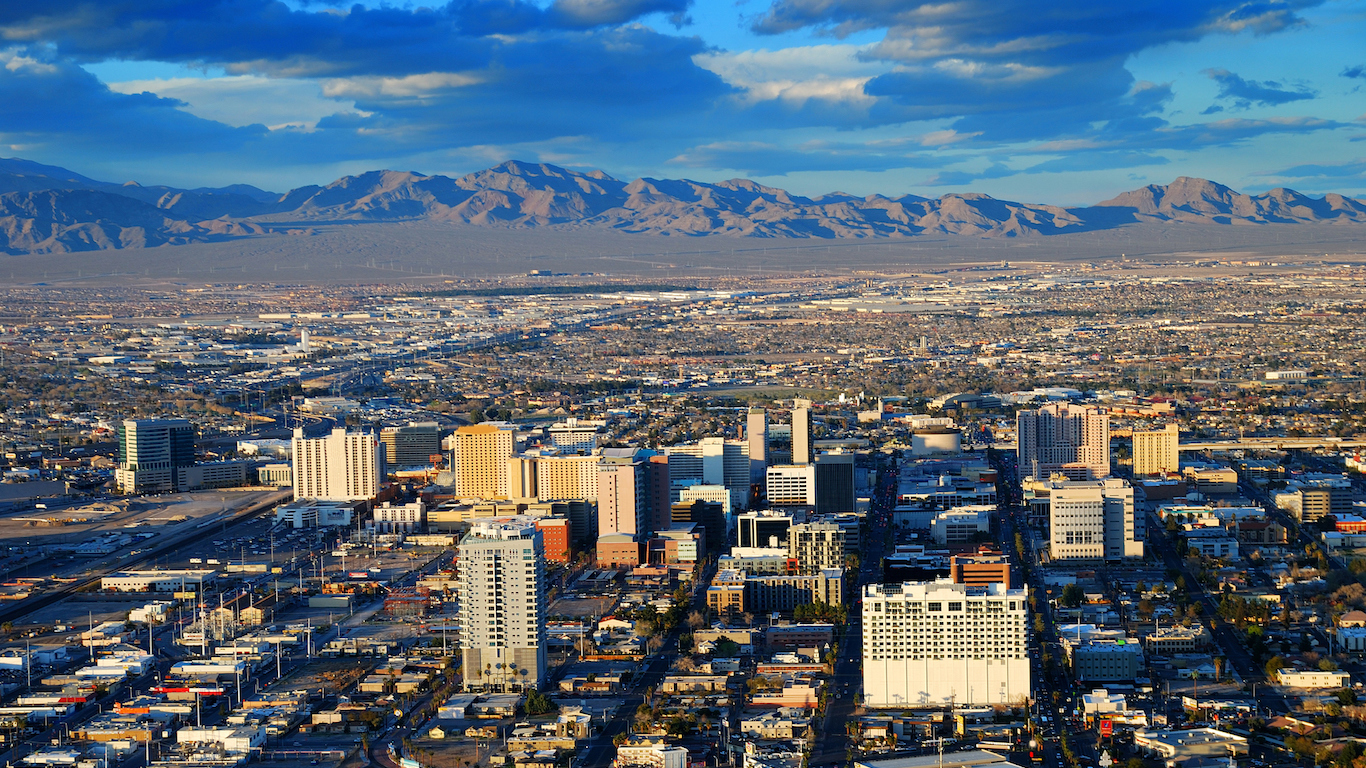
5. Nevada
> Ballot name: Nevada Marijuana Legalization Initiative
> Amount decriminalized: N/A
> Max. fine for 1 oz or less: $600
> Pct. adults using in past year: 12.9%
On Tuesday, voters in Nevada will decide whether or not to legalize marijuana. If passed, the Nevada Marijuana Legalization Initiative, known as Question 2, would legalize possession of up to 1 ounce of marijuana, regulate production and sales of the drug, and establish a 15% excise tax on bulk marijuana sales. Most states voting to legalize marijuana this election have already decriminalized the drug. Nevada, on the other hand, classifies marijuana possession offenses as a misdemeanor.
Nevada legalized medical marijuana use in November 2000. The first medicinal dispensary in the state opened in August of 2015, and today there are 45 throughout the state. In the most recent survey, 12.9% of adults in Nevada reported using marijuana in the past year, in line with the national share. If the ballot initiative passes, it is highly likely that marijuana use will increase in Nevada.
Are You Ahead, or Behind on Retirement?
If you’re one of the over 4 Million Americans set to retire this year, you may want to pay attention. Many people have worked their whole lives preparing to retire without ever knowing the answer to the most important question: am I ahead, or behind on my goals?
Don’t make the same mistake. It’s an easy question to answer. A quick conversation with a financial advisor can help you unpack your savings, spending, and goals for your money. With Zoe Financial’s free matching tool, you can connect with trusted financial advisors in minutes.
Why wait? Click here to get started today!
Thank you for reading! Have some feedback for us?
Contact the 24/7 Wall St. editorial team.

